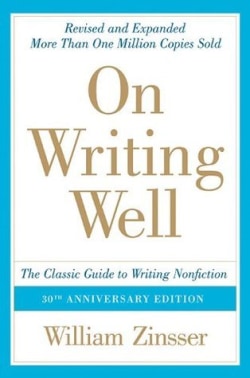Writing a review on a book about writing is sort of meta, don’t you think? Mentioned as The Classic Guide to Writing Nonfiction; On Writing Well is a book that is recommended as one of the best books on the topic of writing. And I had my expectations set high when I started reading it.
It sounds pretentious, but I felt honored to take excerpts from this book and write them down in my notebook for later use. Some of the sentences where of the most simple, clear, and carefully edited sentences I’ve ever read. And they embody the helpful and concrete tips on making your writing better—as expected from this type of book.
A few of the notable insights from this book:
- Clear thinking becomes clear writing: Clear thoughts are crucial for writing clearly. Writing with an unstructured mind will end up in an unstructured result. Writing will also help you think clearer.
- Rewriting is one of the most important parts of writing: No paragraph is ever perfect on the first try. No sentence will ever be as thoughtful and clear as you intend in your first draft. Or in your third. Editing is a crucial step you need to take to ensure that your reader understands what you are saying. Continuously ask your self, “Have I said what I am are trying to say?”
- Be yourself when you write: Don’t use words or phrases that you normally won’t use. Be yourself. Don’t exaggerate. Don’t lie. Be true to yourself.
- Imitate what you like: Imitation is a powerful form of art. If you find a writer that you admire, don’t be afraid to dive into their writings and analyze why you like them and their style so much. Then try to replicate it on your own work.
- You can write about anything: No rule prevents you from writing about a certain topic. You will have a specific take on the subject. If something interests you, it’s worth writing about. If you are interested in a topic, your readers will notice, and you will write better.
- Don’t focus on a finished product until you have a product: It is easy to fall into the trap of thinking about the finished product before it’s ready. I frequently find myself in this position. And it causes me a lot of trouble. This is a reminder to stop thinking about surrounding things and start focusing on the actual writing. All other things will only be necessary when the text is ready, and when I’ve said what I intended to say in the form that I intended to say it.
This is a well-written book on the topic of writing. But parts of the book is, however, not true to itself. A few of the later chapters make extensive use of excerpts from other writers and their work to make examples. And they complicate the simplicity for me. I had to force myself to keep reading these chapters, but I am glad that I did because they were valuable in the end.
This book will prove valuable to me for a long time ahead. And I am sure that you will find it useful too!
